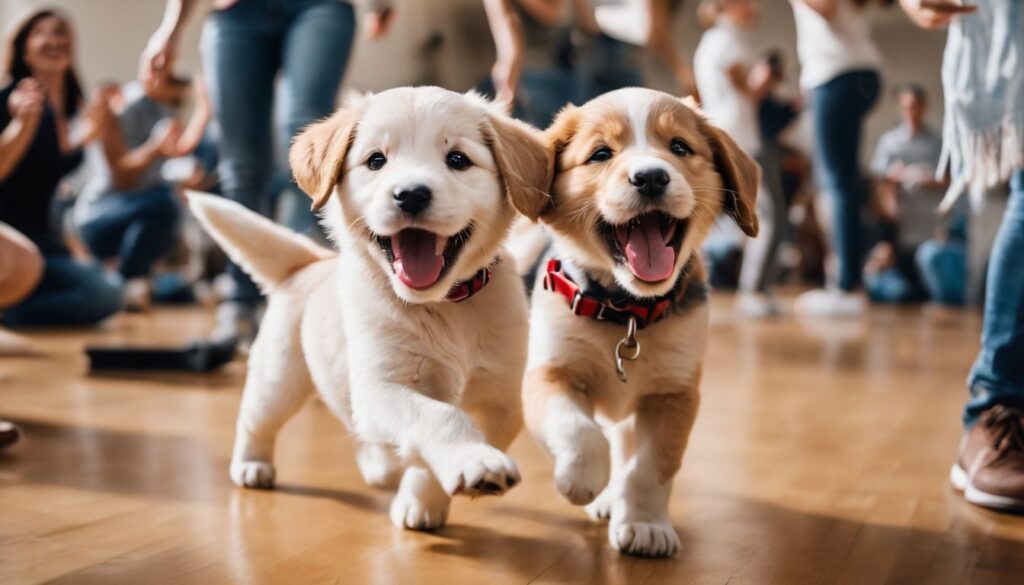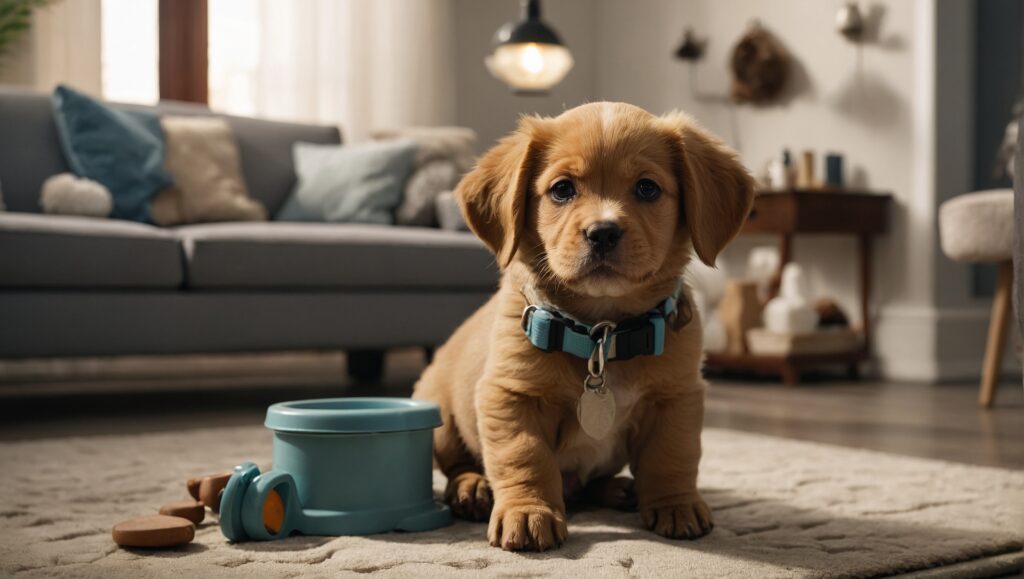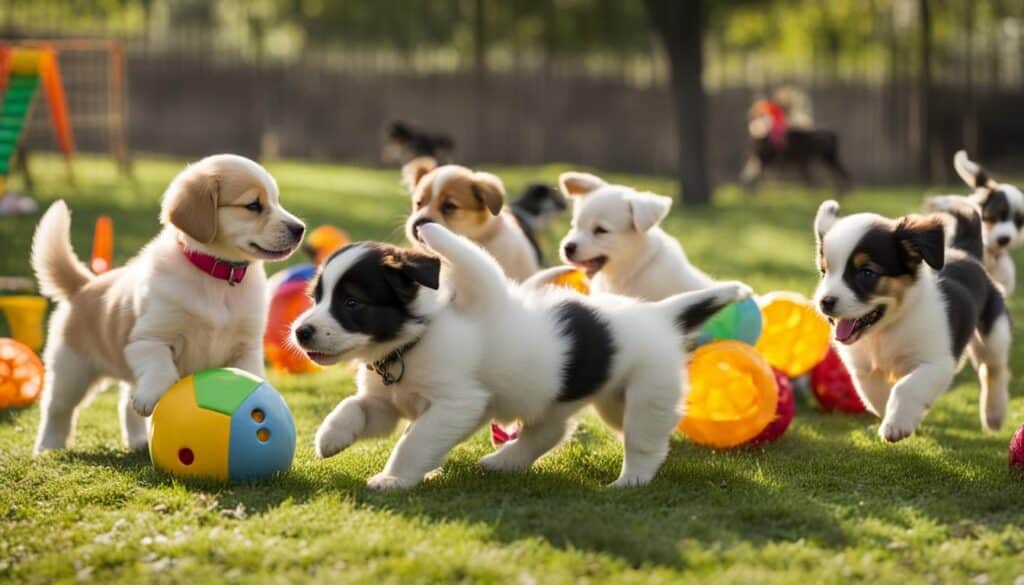Bringing a new puppy into the home can be as challenging as joyful, with common hurdles such as chewed-up shoes and indoor accidents often overshadowing the excitement.
Puppy obedience training lays the foundation for a lifetime of good habits and mutual respect between pet and owner—beyond simple tricks or commands. It’s an investment that pays dividends in joy, companionship, and peace of mind.
Keep reading to unlock your puppy’s potential through proven strategies that make obedience training essential and an absolute delight for you and your furry friend.
Let’s embark on this journey together!

Key Takeaways
- Start training puppies early to build trust and teach them good behaviors using positive reinforcement.
- For proper social development, expose puppies to different people, animals, and environments between 8 to 16 weeks old.
- Use consistent commands and keep training sessions fun to help your pup learn better.
- Train your puppy in essential skills like sitting politely for petting, walking on a leash without pulling, coming when called, and staying calm during separation.
- Expect good and bad training days, but remain patient; there is always time to train a dog with the proper methods.
Benefits of Obedience Training for Puppies
Obedience training for puppies offers numerous benefits, such as building trust between the pup and owner, encouraging good behavior, and providing mental stimulation. These key advantages are crucial in shaping a happy and well-adjusted canine companion.
Builds trust between pup and owner
Training a puppy strengthens the bond with its owner. It’s like a two-way conversation where both learn to understand each other better. As you spend time together, your puppy trusts your guidance.
This trust goes beyond learning basic commands; it ties into everyday interactions and adventures you share.
Each training session brings you closer as your pup looks to you for cues on how to behave. Small wins, like when your dog sits or stays on command, create moments of shared success that deepen mutual respect.
Soon enough, this foundation of trust blossoms into an unbreakable bond – one where your pup knows they can rely on you just as much as you count on them for companionship and joy.
Next is understanding why encouraging good behavior is beneficial and necessary for a harmonious relationship between pet and owner.
Encourages good behavior
Obedience training does more than teach your puppy to sit or come. It shapes their entire behavior, setting them up for success in all aspects of life. Positive reinforcement is the key; it rewards good actions with treats, praise, or playtime.
This makes learning enjoyable for your puppy and encourages them to repeat these behaviors.
Puppies thrive on clear guidance and love knowing what’s expected of them. Basic obedience commands provide structure and boundaries that help puppies understand their place in the world.
Consistent practice reinforces these lessons, leading to a well-behaved dog who can please their owners and respond appropriately in various situations.
Provides mental stimulation
Training your puppy is like giving their brain a workout. Just like humans, puppies must think and solve problems to stay sharp. Obedience training challenges their minds. It makes them figure out commands and remember what they learn.
This mental exercise helps prevent boredom and mischief.
Teaching your dog new skills keeps their brain busy. It’s fun for them to learn things like ‘sit,’ ‘stay,’ or ‘come.’ Each command you teach allows your puppy to think and understand you better.
A smart pup is a happy pup, and training gives them the excitement they crave from learning something new daily!
Basics of Puppy Obedience Training
Regarding the basics of puppy obedience training, starting early and being consistent is crucial. Teaching essential commands like sit, stay, and come can set the foundation for good behavior in your pup.
Avoid common training mistakes and focus on positive reinforcement to motivate your puppy.
Importance of early training
Early training is crucial for your puppy’s development. Positive reinforcement techniques can help them understand and learn good behavior effectively during this time. This lays a strong foundation for obedience and sets the stage for a happy and well-adjusted pup.
Starting early also allows your puppy to get used to different environments, people, and experiences, making them more adaptable in the long run. Building trust between you and your furry friend while promoting their overall well-being through positive obedience training methods is essential.
Essential commands to teach
Teaching essential commands is crucial for a well-behaved puppy, promoting safety and communication. Use positive reinforcement to make training fun and effective. Here are the key commands every new puppy owner should prioritize:
- Sit – A fundamental command that encourages calm behavior and control.
- Stay – Builds impulse control and safety, preventing the pup from running into dangerous situations.
- Come – Vital for recall, keeping your pup safe in off-leash environments.
- Down – Encourages relaxation and submissiveness, helpful in managing excitable behavior.
- Leave It – It is essential to teach your pup to resist temptations and avoid potential hazards.
Common training mistakes to avoid
Mistakes to Avoid in Puppy Obedience Training:
- Rushing the training process, as puppies need time to learn.
- Using punishment-based methods can damage trust and confidence.
- Refrain from needing consistency in commands and expectations, confusing the pup.
- Skipping socialization opportunities hinders the pup’s development.
- Overlooking the importance of positive reinforcement leads to slow progress.
- Failing to adjust training methods based on the pup’s learning style and personality.
- Ignoring signs of stress or fear during training sessions can lead to setbacks in progress.
Puppy Development: Exploring the Stages of Puppy Growth and Training Needs
Puppies go through different growth stages. From 8 to 16 weeks, they explore and need exposure to various environments. Socialization is critical at this age for a well-adjusted pup. At around six months old, polite play and housetraining become crucial.
Training sessions should focus on recall and impulse control during this stage of development.
As the puppy reaches one year, mastering basic behaviors is essential. Positive reinforcement training can help teach good behavior from an early age and throughout these crucial developmental stages.
Tips for Successful Training
Consistency is vital when it comes to successful puppy obedience training. Keeping training sessions fun and engaging will help your pup stay focused and eager to learn.
Consistency is key
Consistency is key in puppy obedience training. Using the same commands and cues helps puppies understand what is expected of them. It also reinforces good behaviors, making it easier for them to learn and remember commands.
Consistent training sessions create a routine that helps puppies know when to expect learning time, which keeps them engaged and focused.
When new puppy owners maintain consistency in their approach, they build trust and reliability with their pups. This forms a strong foundation for successful obedience training, ensuring the puppy understands what is expected of them in different situations.
Keeping training sessions fun
Engaging in play during training sessions can make learning enjoyable for the puppy. Incorporating toys, treats, and games into the training process helps keep the sessions lighthearted and entertaining.
It also strengthens the bond between the pup and owner while reinforcing positive behaviors.
Integrating short bursts of energizing activities amidst training exercises can help maintain a happy and engaged puppy. Infusing fun elements into obedience training becomes an interactive and stimulating experience for the young canine.
Being prepared for good and bad days
When training your pup, expect good and bad days. Consistency is critical, along with patience and understanding. Positive reinforcement techniques like rewards for good behavior can help manage challenging days during puppy obedience training.
Preparing for both good and bad days means being patient, persistent, and maintaining a positive attitude. It’s important to remember that each day is an opportunity for growth and learning.
Embracing the process will ultimately lead to a well-adjusted and happy pup.
How to Socialize Your Puppy During Obedience Training
Expose your puppy to diverse environments and situations during obedience training. Encourage positive interactions with other dogs, people, and varying environments before they reach 16 weeks of age.
Positive experiences during this critical period can help prevent fear-based behavior in the future. Utilize obedience classes as opportunities for socialization, where your puppy can engage with new dogs and people in a controlled environment, fostering confident and well-adjusted behavior.
Incorporate regular outings into your pup’s routine to expose them to sights, sounds, and smells. This will help them become accustomed to various stimuli they may encounter later in life.
Ensure these interactions are positive by using rewards and praise when your pup responds well. Introducing them to a wide range of experiences early on sets the foundation for a friendly dog who is comfortable within their surroundings and around others.
Puppy Obedience Training Timeline
As your puppy grows, their training needs will change, and it’s essential to understand the milestones of puppy development for successful obedience training. To learn more about the stages of growth and training needs, read on!
Growth stage (8-16 weeks): exposure to the environment, impulse control
Your puppy’s development is crucial during the growth stage (8-16 weeks). Expose them to various environments, people, and animals to build their confidence and social skills. Encourage positive interactions and provide gentle guidance to help them learn impulse control.
Create a safe environment for exploration while reinforcing good behavior with rewards. Remember that positive experiences during this time can shape your puppy’s temperament for life.
Incorporate obedience training into daily activities to foster a well-balanced and socially adept companion, setting the foundation for future training success.
Puppy stage (6 months): polite play, housetraining, being alone, recall, continued impulse control
At the 6-month mark, your puppy will exhibit more controlled and polite play behavior. This stage is ideal for reinforcing housetraining habits and teaching your pup to stay comfortable when alone.
Prioritize recall training to ensure that your now slightly more independent puppy responds reliably to commands. Additionally, continued impulse control exercises are vital at this stage as your puppy grows and becomes stronger.
Growth stage (1 year): mastery of basic behaviors
As your puppy approaches the 1-year mark, they should have mastered basic obedience behaviors that set a foundation for good conduct. At this stage, it’s crucial to continue positive reinforcement training to ensure consistent and reliable responses from your pup.
Remember, establishing clear boundaries and expectations and ongoing training will help solidify their understanding of commands and expected behavior.
Focusing on reinforcing these learned behaviors while gradually introducing more advanced commands can help keep your dog engaged and responsive as they mature into well-behaved dogs – preparing them for continued success in obedience training.
Is it ever too late to train a dog?
It’s always possible to do obedience training for your dog. Positive methods can help dogs of all ages learn and adapt. Older dogs can benefit from mental stimulation and socialization just like puppies, making training a fulfilling experience at any stage of life.
Training classes allow older dogs to interact with new people and other dogs, contributing positively to their overall well-being. Positive reinforcement techniques, such as rewarding good behavior, are effective for promoting learning in older dogs while maintaining a happy and healthy bond between you and your furry friend.
Ten Essential Skills for the Canine Good Citizen Test
New Puppy Owners, here are the essential skills for the Canine Good Citizen test:
- Sitting Politely for Petting: Teaching your puppy to sit calmly while being petted helps with interactions and socialization.
- Walking on a Loose Leash: Practice walking with your puppy without pulling on the leash, promoting good behavior during walks.
- Coming When Called: Training your puppy to come when called ensures their safety and builds trust between you and your pup.
- Sit and Down on Command: Teaching these commands encourages impulse control and obedience in various situations.
- Staying in Place: Training your puppy to stay in one place is crucial for their safety and well-being.
- Polite Greetings: Encouraging your puppy to greet people politely helps with socialization and building positive relationships.
- Good Behavior Around Distractions: Training your puppy to maintain good behavior in different environments and situations is essential.
- Reacting Positively to Other Dogs: Socializing your puppy with other dogs is vital for their well-being and development.
- Comfort with Being Handled: Ensuring your puppy is comfortable being handled by strangers or during veterinary visits is critical.
- Calm Behavior During Separation: Teaching your puppy to remain calm when separated from you promotes independence and reduces anxiety.
Conclusion
Puppy obedience training builds trust and encourages good behavior. It provides mental stimulation, which is essential for a happy pup.
Early training is essential to teach basic commands and avoid common mistakes.
During growth stages, exposure to different environments and impulse control are essential.
Consistent positive reinforcement techniques will lead to a well-adjusted pup that responds positively to commands. Obedience classes offer socialization opportunities crucial for a puppy’s development.
Incorporating puppy training into daily life ensures a happy and well-adjusted dog.
Dr. Sarah Johnson, an experienced veterinarian with extensive knowledge in canine behavior and training, emphasizes the importance of early socialization for puppies’ overall development as it helps prevent behavioral issues later on while promoting better adjustment in various situations.
Dr. Johnson states positive reinforcement fosters good behavior by utilizing rewards effectively.
Ethically speaking, she underlines the significance of certifications and transparent communication from trainers or professionals conducting such programs.
Dr. Johnson also recommends integrating obedience training into regular interactions with your puppy as part of daily routines like walks or playtime; it reinforces learning and strengthens the bond between owners and their pets.
When assessing the pros and cons, Dr. Johnson highlights the effectiveness of positive methods while cautioning about potential challenges if not consistently implemented during everyday interactions.
In her final verdict, Dr. Sarah stresses that Puppy Obedience Training: Positive Methods For A Happy Pup offers substantial value in shaping a polite pet able to master the required skills for its well-being.

